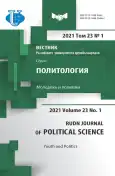Youth Public Associations’ Political Engagement in Russia: The Case of Krasnodar Krai
- 作者: Pilipenko A.D.1
-
隶属关系:
- Lomonosov Moscow State University
- 期: 卷 23, 编号 1 (2021): Youth and Politics
- 页面: 172-185
- 栏目: YOUTH IN POLITICS: A REGIONAL DIMENSION
- URL: https://journal-vniispk.ru/2313-1438/article/view/322140
- DOI: https://doi.org/10.22363/2313-1438-2021-23-1-172-185
- ID: 322140
如何引用文章
全文:
详细
The article defines the place and role of youth public associations in the socio-political processes of modern Russia, analyzes the political activity of Russian youth. The study was conducted among young people in the Krasnodar region using the questionnaire developed by the author, as well as methods for determining the level of activity and motivation of the population. The data obtained allow us to determine the degree of involvement of young people in the activities of NGOs and political processes in the Krasnodar territory. The conducted research has shown the strengthening of the influence of youth public associations on socio-political processes, personnel policy, activation of their activities in the field of public diplomacy, volunteer movement, articulation of the interests of young people as a special social group of the population. Youth public associations are able to structure and regulate the activity of young Russian citizens, directing it in a constructive direction, while reducing the degree of protest moods if it is present. They do this work more effectively than the authorized state authorities, because they act “on the ground”, i.e. they work directly with representatives of the youth community, understand their needs, catch the mood and are able to change the current agenda without resorting to radical methods.
作者简介
Alexander Pilipenko
Lomonosov Moscow State University
编辑信件的主要联系方式.
Email: pilipenkorussia@gmail.com
Postgraduate of the Faculty of Political Science
Moscow, Russian Federation参考
- Aleshchenok, S. V. (1998). From the experience of supporting public initiatives and volunteerism. Moscow: Socis Publ. (In Russian).
- Andreeva, O. A. (2014). Regional legal policy of overcoming extremism in the youth environment: Realities and forecasts. State Power and Local Self-government, 9, 28–31. (In Russian).
- Arato, E. (2018). Civil society and political theory. Moscow: Mir Publ. (In Russian).
- Arutyunyan, M. N., & Dolgunova, N. A. (2015). Youth unemployment in modern Russia. Actual Problems of Economics, Sociology and Law, 2, 24–27. (In Russian).
- Babosova, E. S. (2015). Increasing the importance of state youth policy in the political socialization of youth. Sotsiologicheskii Almanakh, 2017, 6, 77–83. (In Russian).
- Bagdasaryan, N. G., Nemtsov, A. A., & Consusyan, L. V. (2016). Postgraduate Expectations of Student Youth. Moscow: Socis Publ. (In Russian).
- Borisko, O. A., & Mirontseva, S. A. (2016). Theoretical model of formation of regional identity of youth in the cultural and educational environment of the region. Society: Politics, Economics, Law, 12, 6–9. (In Russian).
- Dudnik, I. S. (2016). The Role of Voluntary Movements in the Formation of the Moral Consciousness of Young Citizens. Moscow: Vlados Publ. (In Russian).
- Ermolin, A. A. (2019). Youth of Russia in Non-System Analysis of the National Idea. Moscow: Public Education Publ. (In Russian).
- Fedorov, A. V. (2014). Does modern youth have a spontaneously formed high level of media competence? Media Education, 2, 82–87. (In Russian).
- Gribanova, V. A. (2018). Study of civil activity of students. Otechestvennaya i Zarubezhnaya Pedagogika, 3(50), 164–171. (In Russian).
- Grosheva, I. A., Groshev, I. L., & Grosheva, L. I. (2018). Index evaluation of the effectiveness of youth entrepreneurship and business. Agri-food Policy in Russia, 7, 50–53. (In Russian).
- Hovhannisyan, H. (2016). Idea and models of civil society: Development tendencies, arguments pro and con. Wisdom, 2(7), 95–102.
- Kudinov, V. A. (2016). Historical conditionality of adolescent and youth organizations. Vestnik of Kostroma State University. Series: Pedagogy. Psychology. Sociokinetics, 3, 235–238. (In Russian).
- Miroshnichenko, I. V. (2017). Network mechanisms of formation of social and political identities of modern youth. Izvestiya of Saratov University. Series: Sociology. Political Science, 1, 92–97. (In Russian).
- Rodionov, V. A. (2002). The Situation of Youth and the Implementation of State Youth Policy in the Russian Federation. Moscow: Socium Publ. (In Russian).
- Samarkina, I. V. (2011). Youth and the formation of its political picture of the world in modern social and humanitarian studies. Theory and Practice of Social Development, 5, 6–11. (In Russian).
- Sazantovich, A. B. (2017). Visual Image of Europe in the Views of the Kuban Youth. Perception of Europe in the Youth Environment in the Context of Modern Geopolitical Transformations (Based on the Materials of Krasnodar and Yerevan). Krasnodar: Kuban State University publ. (In Russian).
- Serdalieva, D. A. (2006). Sociological analysis of youth organizations of Russia. South-Russian Bulletin of Geology, Geography and Global Energy (Scientific and Technical Journal), 6(19), 91–95. (In Russian).
- Smirnov, V. A. (2014). Youth policy as a sphere of reproduction of the simulation. RGGU Bulletin. Series: Philosophy. Sociology. Art History, 4(126), 204–213. (In Russian).
- Vishnevsky, J. R. (2014). Civil Culture of Students, Moscow: Socium Publ. (In Russian).
- Vlasova, E. D. (2015). About the effectiveness of youth policy in Russia. Innovation Science, 4(3), 174–177. (In Russian).
- Vlasova, E. D. (2016). Implementation of the concept of state youth policy in Russia. Theory and Practice of Social Development, 11, 32–35. (In Russian).
- Zbrowski, G. E. (2019). The Legal Status of the Organizations. Moscow: Socis Publ. (In Russian).
补充文件









